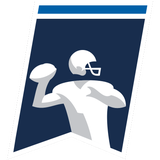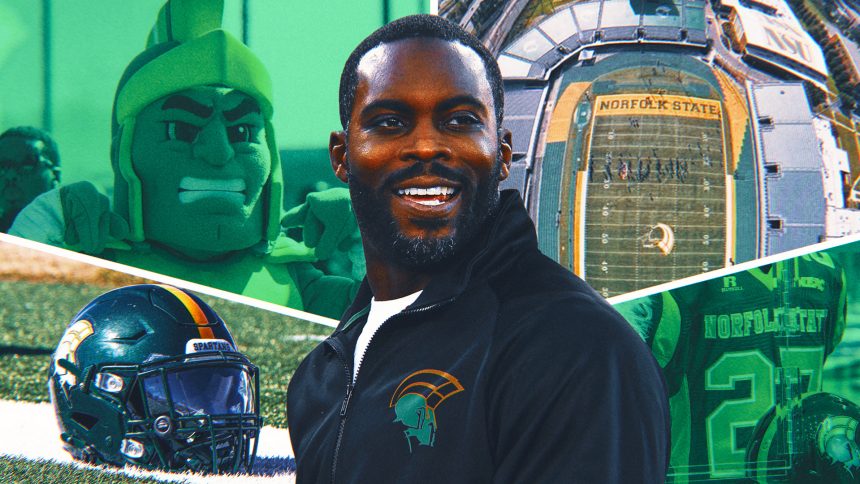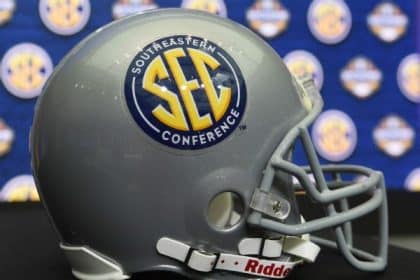Moments after the first home game of the College Football Playoff era kicked off Friday night at Notre Dame Stadium, Michael Vick is on the phone explaining how he plans to build a program capable of winning at Norfolk State.
As Marcus Freeman became the first Black head coach to win a CFP game, pushing the Fighting Irish one step closer to winning a national championship, Vick is starting from scratch. He’s putting together a staff. He is working toward recruiting players. He’s hustling his kids into the car while explaining how he’s going to pitch players and parents on his vision for Spartan football.
“I understand the position that Norfolk State is in,” Vick said. “I understand where we are. There’s going to be a lot of kids out there that are looking for opportunities to play football, to play at a level where they can continue to grow. I’m looking forward to that part, working with kids each and every day, as opposed to, you know, a two-day football camp.
“Instead of watching them grow over two days, now I get to coach them each and every day with a great coaching staff who’s going to assist in making sure that these kids play their best brand of football.”
ADVERTISEMENT
Who’s on that staff? He’s working on it. Which players is he looking to sign? The best. What’s his timetable for success? Make tomorrow better than today.
Vick, 44, officially became the 19th head football coach at Norfolk State, a relatively young Historically Black College with nary a triumph at the FCS level. In fact, the program hasn’t finished with a winning record since 2021, which was the last year a Norfolk State player, Justin Smith, signed a professional football contract, inking a deal with the Houston Roughnecks in the USFL.
In 2011, the Spartans looked like they were set to take a step forward after winning the Mid-Eastern Athletic Conference (MEAC) Championship and earning a bid to the FCS playoffs, only to have their title stripped in 2016. A total of 48 student-athletes were found ineligible across 11 sports and three football teams from 2009 to 2011.
The university endured two years of NCAA-mandated probation, as well as reductions in scholarships across all 11 sports. When Dawson Odums took over the football program in 2021, he did so after putting together eight consecutive winning seasons with four West Division titles and one conference championship at Southern University. Still, his first season was the only one where the Spartans won more games than they lost over the next four years. Odums was relieved of his duties in November, posting a 15-31 record during his four seasons at Norfolk State.
Enter Vick, who had been waiting for an opportunity to jump back into coaching since he first interned for Andy Reid and the Kansas City Chiefs back in 2017. Vick has maintained a steady dialog with Reid when it comes to the subject of coaching. He spoke with Pittsburgh Steelers head coach Mike Tomlin about the prospect of coaching as well. Recently, he picked the brain of perhaps the most well-known player-turned-coach success story in Deion Sanders.
Sanders led Jackson State to a pair of SWAC championships before heading to Colorado, where he flipped the program from two wins prior to his arrival, to four in his first year, to nine in his third, with the Heisman winner playing for him.
“I reached out to Deion just to have a conversation with him,” Vick said. “The conversation was more so about philosophy and the most important steps to get started. He reminded me I’d have a bunch of people pulling for me.”
But Vick, who has been with FOX Sports since 2017, serving as an analyst for “FOX NFL Kickoff,” needed to make the right decision first. He had two choices during this last coaching cycle: Norfolk State and Sacramento State.
The Hornets had built an attractive program, making the FCS playoffs in three out of the last four years. Former head coach Troy Taylor accepted a Power 4 head coaching job at Stanford in December 2022. They’d also built an NIL community with a goal of raising $50 million and ascending into the highest division of the sport.
“Sacramento State had a great situation. They had tons of NIL money and tons of opportunity,” Vick said. “But I didn’t want to make my decision based on money. I wanted to make it based on what I could do and who I could sincerely help. And I think, you know, I can help on both sides. But I felt like it was great to go back home and do it in my backyard. And that was probably the deciding factor, having the chance to do it back where I grew up.”
*** *** ***
When Vick called, it was from a number with a 757 area code, where he made his name at Warwick High School in Newport News, Virginia — A.K.A. Tidewater. The Tidewater area is renowned for the talent it has produced, especially in sports. The list of star athletes the 757 has produced is staggering, from Vick and Lawrence Taylor in the NFL, to Alonzo Mourning and Allen Iverson in the NBA, to three-time Olympic Gold Medalist Gabby Douglas.
When Mack Brown became the head coach at North Carolina, he made recruiting the 757 a priority, developing players like Dre Bly, who later coached for Brown in Chapel Hill, and was inducted into the College Football Hall of Fame — just like Brown.
“We actually recruit Tidewater like it’s in-state,” Brown told me in 2021. And the legacy of the place and people to make their mark on America was yet another recruiting advantage for the coach that turned Vince Young and Drake Maye into household names, too.
“Modern day, you need to be the cool place to be,” Brown said. “And if people see you having fun and your players are your best recruiters, then they’re going to tell the other kids, ‘Come here, man. This is cool. This is fun.’ What you see is real. They’re not making this stuff up.”
No one was more fun to watch than Vick, or more ruthless when a play broke down. During his college playing days at Virginia Tech, Vick juked Florida State edge rushers Tommy Polley and Roland Seymour so badly in the 1999 Sugar Bowl, that both blew out an ACL in their knees. Vick was such a gifted athlete that he was selected in the 30th round of the 2000 MLB Draft by the Colorado Rockies, despite not playing baseball since eighth grade. It wasn’t a question of whether the Atlanta Falcons would select him with the first pick in the 2001 NFL Draft. The only question was what would Vick do in the NFL? The answer: Whatever he wanted.
He was so cold that we called him by his first and last name. “Mike Vick” was like yelling hallelujah at church. By the time he graced the cover of “Madden 2004,” he’d already broken the game. To play with Vick on the joysticks was to cheat.
When Vick left the NFL, he did so as the first quarterback to ever rush for 1,000 yards in a season. He was a four-time Pro Bowler and was named the NFL’s Comeback Player of the Year in 2010 after his return to the league following 21 months in federal prison for his involvement in a dog fighting ring. He was inducted into the College Football Hall of Fame in 2018, and will likely be inducted into the Pro Football Hall of Fame. In the meantime, he expects to fill the minds and hearts of student-athletes who want to play for him, to give them a platform and a plan to succeed.
“The wins and losses, that’s gonna define itself,” Vick said. “At the end of the day, it’s all about being relatable. It’s all about the kids being able to come to you and ask you questions, the door always being open, not being afraid to come to you and tell you how they really feel. It’s a mutual friendship. It’s a mutual relationship that you try to develop.”
Michael Vick is an iconoclast, who tore apart the limits of the quarterback position in the NFL and brought forward the mobile QB not as a gimmick, but as a necessity. In the process, he experienced highs and lows that many never have, and never will. With that experience has come a knowledge so profound that he simply feels called to disseminate it. To pour it out into the place that raised him. To pour it into the players who most remind him of himself, whose story has begun not unlike his. He just wanted the chance to be great. He’s being given that chance once more as a coach, and he’s looking to extend that chance to those who choose to play for him.
RJ Young is a national college football writer and analyst for FOX Sports and the host of the podcast “The Number One College Football Show.” Follow him at @RJ_Young.
[Want great stories delivered right to your inbox? Create or log in to your FOX Sports account, follow leagues, teams and players to receive a personalized newsletter daily.]
recommended

Get more from College Football Follow your favorites to get information about games, news and more












